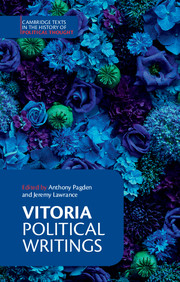Book contents
- Frontmatter
- Contents
- Dedication
- Editors' note
- Abbreviations and sigla
- Introduction
- Principal events in Vitoria's life
- Bibliographical note
- Critical note on texts and translation
- TEXTS
- APPENDICES
- A Four Letters on Political Matters
- B Lecture on the Evangelization of Unbelievers
- Biographical notes
- Glossary
- List of references
- Index
- Cambridge Texts in the History of Political Thought
A - Four Letters on Political Matters
Published online by Cambridge University Press: 05 June 2012
- Frontmatter
- Contents
- Dedication
- Editors' note
- Abbreviations and sigla
- Introduction
- Principal events in Vitoria's life
- Bibliographical note
- Critical note on texts and translation
- TEXTS
- APPENDICES
- A Four Letters on Political Matters
- B Lecture on the Evangelization of Unbelievers
- Biographical notes
- Glossary
- List of references
- Index
- Cambridge Texts in the History of Political Thought
Summary
According to the Portuguese-domiciled Flemish humanist Nicholas Clénard, Vitoria was an energetic and elegant Latin letter-writer ‘who could have achieved European fame as a stylist if only he had set his mind to publication’. However, only five of his letters have survived, all of them business letters rather than literary epistles, and all, unfortunately, composed in the vernacular. Vitoria's crabbed Spanish was markedly inferior to his Latin.
For reasons which are unclear, in the letter to Arcos (1), and to a lesser extent the letter to Vique (2), Vitoria wrote a number of phrases in Latin. The tags are too tiresome to be a stylistic device, too transparent to be a code, and probably indicate merely that Vitoria was more at ease thinking in the scholastic language. The tags have been translated, but printed in italics.
Four of the letters are translated below. The first two were discovered among the papers of Vitoria's superior Miguel de Arcos, OP, in Seville, Biblioteca Universitaria MS 333-166-1, fols. xv-xviv, by Beltrán de Heredia (1931:169–80). The last two are preserved in Madrid, Biblioteca Nacional MS Res-17, fols. 147–50, and were discovered by Hinojosa.
Letter 1: Letter to Miguel de Arcos, OP Salamanca, 8 November [1534]
Vitoria advises his religious superior to have nothing to do with the complex question of compositions in Peru. The massacre at Cajamarca and subsequent assassination of the Inca Atahuallpa by Pizarro (July 1533) attracted much notice in Spain.
- Type
- Chapter
- Information
- Vitoria: Political Writings , pp. 329 - 338Publisher: Cambridge University PressPrint publication year: 1991

